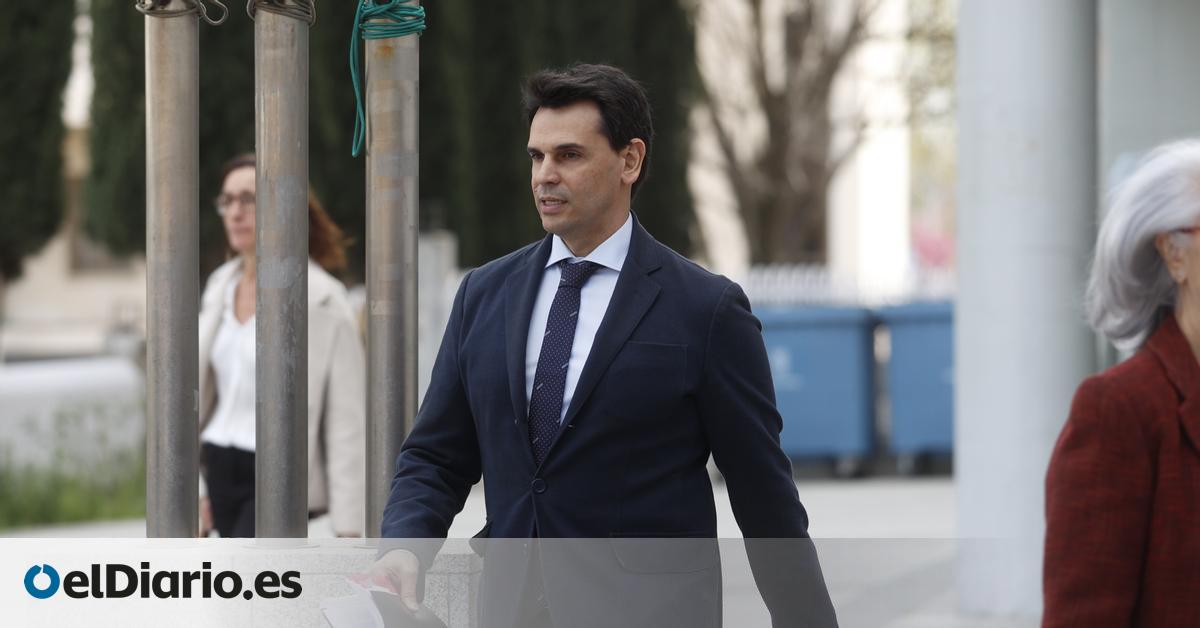
The open case in the Supreme Court for the filtration of an email with the confession of the couple of Isabel Díaz Ayuso still has a testimony ahead: that of the complainant himself, Alberto González Amador. The decision of the Appeals Chamber to force Judge Ángel Hurtado to take a statement to the commissioner opens a path that the State Advocacy had been trying to travel time: ask the businessman to explanations about whether he was the first to disseminate that email and how much information he has hidden from the courts since he began to seek the imputation of the Attorney General.
The citation, which now depends on the calendar of Judge Hurtado, will be the second time that González Amador appears before a court in this case. The first time was in May of last year, when he went to the Superior Court of Justice of Madrid to ratify the complaint he had put a few weeks before denouncing that the Prosecutor’s Office had revealed confidential secrets of his case when issuing a statement. A statement in which the Public Ministry gave some details of the negotiations between its lawyer and the prosecutor of the case of fraud to the Treasury, but with the aim of denying several falsehoods that the businessman’s own environment had put into circulation.
That first complaint, which over time has become an open criminal case against the Attorney General and the provincial prosecutor of Madrid for the filtration of the mail with his confession, omitted data that the State Advocacy considers of extreme relevance. Especially that on February 2, 2024, lawyer Carlos Neira, one of those who defends the couple of Isabel Díaz Ayuso, not only sent the mail with the proposal of Pact to the prosecutor Julián Salto but also to a state lawyer.
“I just sent another proposal in relation to a new complaint for a fiscal crime to Prosecutor’s Office,” said lawyer Neira in that email sent to the State Advocacy, which defends the Treasury in that type of lawsuits. He did it a month and several days before he was denounced, that eldiario.es uncovered the case and that finally his confession, real or manipulated, he arrived at the Attorney General’s Office and the media.
The intention of the State’s lawyers who defend Álvaro García Ortiz and Pilar Rodríguez, as well as the Lieutenant Prosecutor of the Supreme Court, is that González Amador explains, forced to tell the truth as a witness, if he or his environment were effectively the first to spread his own confession, long before the filtration that he and Ángel Hurtado attribute to the general prosecutor and his closest team. And explain why this data, relevant in a case on the revelation of secrets, has been hidden from the courts that have studied their complaints.
State advice has made it clear that this discovery does not imply that this institution is suspected of having filtered the mail. They understand that it is a more evidence that demonstrates that González Amador and his lawyer never considered that this confession was something secret, highlighting “the null confidential value or reserved nature granted to the content of the mail even by the lawyer of Mr. González Amador.”
The Prosecutor’s Office has also spoken in that direction: “In the complaint, and successive procedural writings of Mr. González Amador no reference has been made to a similar mail, or identical, sent to the Prosecutor’s Office had been referred on the same day February 2, 2024 to the State Advocacy, which should be the object of explanation.” The judge, to date, had limited himself to contributing all this to the actions without making any decision in this regard. Now you will have to set an interrogation about it.
Miguel Ángel Rodríguez’s leaks
Both the State Advocacy and the Prosecutor’s Office have also expressed, in their resources and in the interrogations, the need for the complainant himself and his environment to explain a second thing: if he authorized Miguel Ángel Rodríguez to spread an email from the prosecutor who investigated him. Isabel Díaz Ayuso’s own chief of Cabinet recognized him in his testimony, explaining his contacts with the businessman and assuming in part that on the afternoon of March 13 he broadcast, from his phone, a manipulated version of the negotiations that González Amador maintained with the Prosecutor’s Office but distributing among journalists a real mail. Of prosecutor Julián Salto.
That dissemination was the one that led to a first false information that implied that it was the Prosecutor’s Office who proposed a pact to the commission – and not vice versa – and that said agreement would have been stopped by orders from above, which was the thesis that defended from the beginning the chief of the cabinet of Ayuso.
For defense and the Prosecutor’s Office, today, there are no evidence to attribute to Álvaro García Ortiz or Pilar Rodríguez the filtration of that mail on the night of March 13 of last year. The intervened messages and emails verify the nervousness that reigned that day in the Prosecutor’s Office to achieve all the information in the case and deny the bulles of Miguel Ángel Rodríguez, but no express order or evening of filtering the press the content of the mail.
Revelations on the authentic tour of that confession, understand the defenses, points in the direction of dismissal or, in case of reaching the trial, that of an acquittal for the Attorney General. Before the judge, González Amador must explain what documents he sent to Miguel Ángel Rodríguez, how he authorized his dissemination and why some emails did seem confidential and others did not. In addition to ratifying whether, as Rodríguez said, he spent the incomplete postal chain or also the previous email where he confessed his crimes and evidenced that the proposal of agreement departed from his lawyers.
So far, Judge Hurtado has subtracted importance to any indication that he points in that direction. He did not consider it necessary to deepen the role of Ayuso Cabinet Chief in the case after his testimony, nor did he understand that the diffusions of documents authorized by the businessman himself steal criminal prominence to the facts he attributes, Auto after Auto, to the State Attorney General.
“It is not enough to understand the incidence that email may have,” said Hurtado about the recognized fact that Miguel Ángel Rodríguez leaked one of the emails of the case. Especially since, according to the judge, “it is disseminated from the authorization of the person to whom the secret concerns,” that is, Alberto González Amador.
The citation will also be an opportunity for Isabel Díaz Ayuso’s couple to explain how that filtration harmed him. An argument that Judge Hurtado himself has already bought in some of his cars: the advertising of his confession, even if it were only in general terms, facilitated that dozens of political leaders begin to refer to him as a “confessed fraud.” His other great legal battle: try to condemn the civil via (and claim hundreds of thousands of euros in compensation) who has referred to him with that term.
Source: www.eldiario.es

